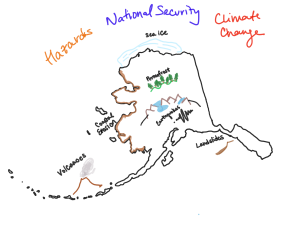January 10, 2019
What is the Value of the Geosciences?
Posted by bwebster
Today’s post is part of a series written by student bloggers from the AGU Fall Meeting 2018.
By: Emilie Sinkler, a PhD candidate in Galciology at the University of Alaska, Fairbanks.
Geoscientists study many different aspects of the world around us, under us, and above us. Knowledge about our world informs how and where we build our homes, streets, and other infrastructure. It also causes us to reconsider our actions and push for collective responses. It gives us energy and power, both physically and globally. It can cause major shifts in government policies, or even make us rethink the nature of our existence.
Lisa Murkowski, Senator from Alaska, who represents a state rich in geological phenomena and geoscientists (I’m one of them), has a strong appreciation for the geosciences, though I doubt she would get as philosophical about the study as I just did.
Many scientists, Alaskan and not, came to hear her invited talk at the AGU Fall Meeting.
With about 28,500 attendees, the AGU Fall Meeting population is larger than many communities in Alaska, and Senator Murkowski admitted to feeling intimidated. She got several laughs when she likened the crowd to “Sitka or Ketchikan.” A veteran member of Congress, Senator Murkowski has sponsored many bills based on and supporting science. She spoke passionately about the importance of maintaining funding for hazards research and monitoring, specifically referencing the magnitude 7.0 earthquake that struck near Anchorage only two weeks before the meeting. Shortly, after the earthquake, she toured Anchorage, surveying damage and meeting with constituents, and commended Alaskan scientists on their help in making sure the community was prepared so that the damage and injury was minimal. She also made a point to reference two bills that she supports, one related to volcano risk assessment and early warning systems and one related to landslides and asked that AGU scientists speak with their legislators about these bills. Senator Murkowski also talked to the importance of science in national security and a strong economy.
‘The challenge’ – climate change – was also a major topic of her speech. As a Senator from Alaska, she knows that the Arctic is warming much faster than the rest of the globe. Her statement “It is real, it is happening, it is now” got a strong round of applause from an audience full of scientists, many of whom conduct climate research.
Senator Murkowski stressed that scientists need to translate their research into language that politicians can understand. Communicating our research is critical, and Murkowski reminded us that analogies and physical models can help non-scientists grasp complex ideas. She also stressed putting a face on our ideas – making them personal. When she talks to her colleagues in Congress, she doesn’t use graphs, figures, and statistics, she uses stories. Graphs and figures are things that most people understand, but they don’t relate to them. Using a story makes the problems personal – it’s the subsistence hunters in rural Alaska who are feeling the effects of climate change, it’s the department of transportation worker who works overtime to make sure the warmer-than-usual, icy roads don’t lead to car crashes. These are the stories and people that make issues personal and push legislators to action.










